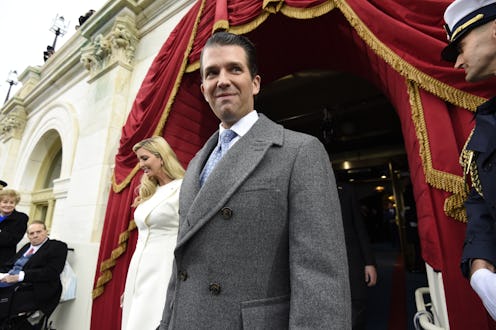News
Donald Trump Jr. DMed With WikiLeaks In 2016 & Here's Why That's So Major

The Atlantic reported Monday that Donald Trump Jr. and WikiLeaks corresponded during the 2016 campaign. According to private Twitter messages, WikiLeaks contacted Trump Jr. through Twitter several times over the course of about a year, from July 2016 to July 2017, making various requests and offers. When contacted by the Atlantic, a lawyer for Trump Jr. said that "we have no concerns about these documents, and any questions raised about them have been easily answered in the appropriate forum." He didn't deny that the messages were authentic.
The conversations between Trump Jr. and WikiLeaks contradict the campaign's official claims that it did not coordinate with WikiLeaks. On October 12th 2016, WikiLeaks sent Trump Jr. a link to a website with hacked emails from the Hillary Clinton campaign. No more than 15 minutes later, Trump himself tweeted about the "incredible information provided by WikiLeaks," and two days after that, Trump Jr. tweeted out the link that WikiLeaks had provided him.
In an interview with Fox News that same day, Mike Pence cited emails stolen from Clinton and published by WikiLeaks as evidence of Clinton's duplicity. He also flatly denied that the campaign was "in cahoots" with WikiLeaks, telling Fox News that "nothing could be further from the truth."
Hours after the Atlantic report was published, Trump Jr. tweeted images of what he claims are "the entire chain of messages with @wikileaks." The conversations depicted in the images match up with and appear to confirm the Atlantic's reporting.
According to the Atlantic, the conversations between Trump Jr. and WikiLeaks were handed over to Congress as part of its investigation into possible Russian interference in the 2016 election. They show that, in addition to giving Trump Jr. a link to stolen emails from the Hillary Clinton campaign, WikiLeaks asked him to investigate an anti-Trump PAC, and encouraged Trump to contest the election results if he lost. After the election, WikiLeaks suggested that president-elect Trump tell Australia to make Julian Assange its ambassador to the United States.
Trump Jr. appears to have acted on WikiLeaks' requests at least twice. On Sept. 20th, 2016, WikiLeaks messaged Trump Jr. on Twitter about an anti-Trump PAC that was about to launch, according to the Atlantic. “The PAC is a recycled pro-Iraq war PAC," WikiLeaks allegedly wrote. "We have guessed the password. It is ‘putintrump.’ See ‘About’ for who is behind it. Any comments?”
“Off the record I don’t know who that is, but I’ll ask around,” Trump Jr. allegedly replied the next day. “Thanks." A source told the magazine that after receiving the message, Trump Jr. emailed Jared Kushner, Steve Bannon, Kellyanne Conway and other senior Trump campaign officials to tell them that WikiLeaks had contacted him.
Assange addressed the Atlantic report on Twitter shortly after it was published. The WikiLeaks founder said that he "cannot confirm the alleged DM's from @DonaldJTrumpJr to @WikiLeaks" and that WikiLeaks "does not keep such records."
In the same tweet thread, however, Assange said that the messages "show" that "Wikileaks can be very effective at convincing even high profile people that it is their interest to promote links to its publication." This would appear to confirm that the messages are indeed authentic, despite Assange's claim that he can't give such confirmation. Bustle has reached out to Assange for clarification on this point.
According to the messages, WikiLeaks encouraged the Trump campaign to contest the election results if Clinton won, arguing that "the discussion can be transformative as it exposes media corruption, primary corruption, PAC corruption, etc." After Trump won, WikiLeaks told Trump Jr. that it "would be real easy and helpful for your dad to suggest that Australia appoint Assange ambassador to [Washington,] DC.”
At the time, Assange was living in the Ecuadorian embassy in London to avoid being arrested on sexual assault charges. An ambassadorship to the U.S. could have given him diplomatic immunity; however, he was never offered such an ambassadorship, and as of this writing, is still holed up in the Ecuadorian embassy.